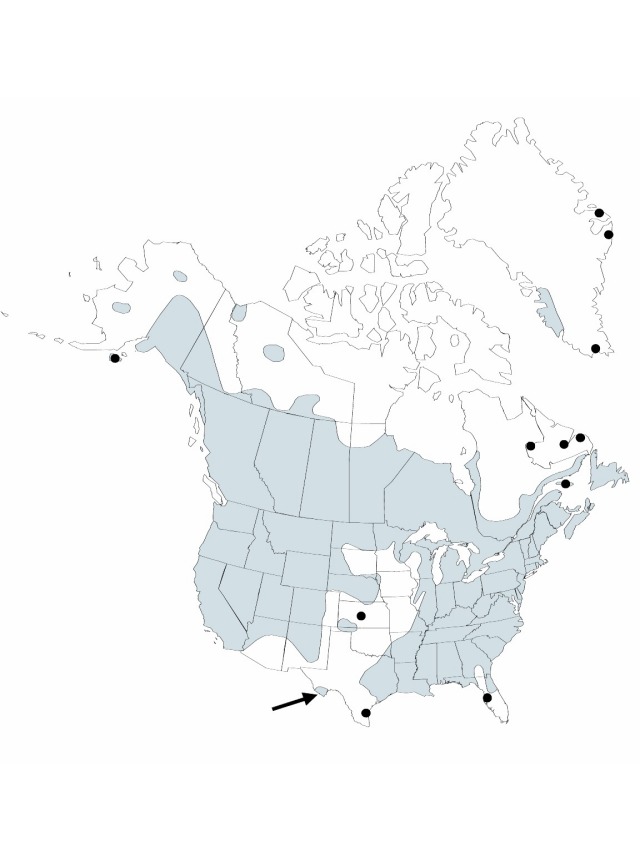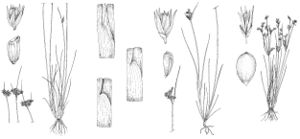Difference between revisions of "Juncus bufonius"
Sp. Pl. 1: 328. 1753.
FNA>Volume Importer |
FNA>Volume Importer |
||
| Line 11: | Line 11: | ||
|name=Juncus bufonius var. congestus | |name=Juncus bufonius var. congestus | ||
|authority=(S. Watson) Fernald | |authority=(S. Watson) Fernald | ||
| − | }}{{Treatment/ID/Synonym | + | }} {{Treatment/ID/Synonym |
|name=Juncus bufonius var. halophilus | |name=Juncus bufonius var. halophilus | ||
|authority=Buchenau & Fernald | |authority=Buchenau & Fernald | ||
| − | }}{{Treatment/ID/Synonym | + | }} {{Treatment/ID/Synonym |
|name=Juncus bufonius var. hybridus | |name=Juncus bufonius var. hybridus | ||
|authority=Farwell | |authority=Farwell | ||
| − | }}{{Treatment/ID/Synonym | + | }} {{Treatment/ID/Synonym |
|name=Juncus bufonius var. occidentalis | |name=Juncus bufonius var. occidentalis | ||
|authority=F. J. Hermann | |authority=F. J. Hermann | ||
| − | }}{{Treatment/ID/Synonym | + | }} {{Treatment/ID/Synonym |
|name=Juncus bufonius var. ranarius | |name=Juncus bufonius var. ranarius | ||
|authority=Farwell | |authority=Farwell | ||
| − | }}{{Treatment/ID/Synonym | + | }} {{Treatment/ID/Synonym |
|name=Juncus congestus | |name=Juncus congestus | ||
|authority=unknown | |authority=unknown | ||
| − | }}{{Treatment/ID/Synonym | + | }} {{Treatment/ID/Synonym |
|name=Juncus ranarius | |name=Juncus ranarius | ||
|authority=unknown | |authority=unknown | ||
| Line 43: | Line 43: | ||
|habitat=Moist soils in meadows, along lakeshores or stream banks, ditches, or roadsides, especially frequent in drawdown areas, usually in open sites and often becoming weedy | |habitat=Moist soils in meadows, along lakeshores or stream banks, ditches, or roadsides, especially frequent in drawdown areas, usually in open sites and often becoming weedy | ||
|distribution=Greenland;Alta.;B.C.;Man.;N.B.;Nfld. and Labr.;N.W.T.;N.S.;Ont.;P.E.I.;Que.;Sask.;Yukon;Ala.;Alaska;Ariz.;Ark.;Calif.;Colo.;Conn.;Del.;D.C.;Fla.;Ga.;Idaho;Ill.;Ind.;Iowa;Kans.;Ky.;La.;Maine;Md.;Mass.;Mich.;Minn.;Miss.;Mo.;Mont.;Nebr.;Nev.;N.H.;N.J.;N.Mex.;N.Y.;N.C.;N.Dak.;Ohio;Okla.;Oreg.;Pa.;R.I.;S.C.;S.Dak.;Tenn.;Tex.;Utah;Vt.;Va.;Wash.;W.Va.;Wis.;Wyo.;nearly worldwide. | |distribution=Greenland;Alta.;B.C.;Man.;N.B.;Nfld. and Labr.;N.W.T.;N.S.;Ont.;P.E.I.;Que.;Sask.;Yukon;Ala.;Alaska;Ariz.;Ark.;Calif.;Colo.;Conn.;Del.;D.C.;Fla.;Ga.;Idaho;Ill.;Ind.;Iowa;Kans.;Ky.;La.;Maine;Md.;Mass.;Mich.;Minn.;Miss.;Mo.;Mont.;Nebr.;Nev.;N.H.;N.J.;N.Mex.;N.Y.;N.C.;N.Dak.;Ohio;Okla.;Oreg.;Pa.;R.I.;S.C.;S.Dak.;Tenn.;Tex.;Utah;Vt.;Va.;Wash.;W.Va.;Wis.;Wyo.;nearly worldwide. | ||
| − | |discussion=<p>Nearly worldwide, Juncus bufonius is found essentially throughout North America except north of the Alaskan and Canadian tTaiga. Juncus bufonius is a highly polymorphic complex that is poorly understood systematically. Insufficient evidence exists upon which to base the segregation of the plethora of taxa that have been recognized out of this group in the past.</p> | + | |discussion=<p>Nearly worldwide, <i>Juncus bufonius</i> is found essentially throughout North America except north of the Alaskan and Canadian tTaiga. <i>Juncus bufonius</i> is a highly polymorphic complex that is poorly understood systematically. Insufficient evidence exists upon which to base the segregation of the plethora of taxa that have been recognized out of this group in the past.</p> |
|tables= | |tables= | ||
|references= | |references= | ||
| Line 66: | Line 66: | ||
|publication year=1753 | |publication year=1753 | ||
|special status= | |special status= | ||
| − | |source xml=https://jpend@bitbucket.org/aafc-mbb/fna-data-curation.git/src/ | + | |source xml=https://jpend@bitbucket.org/aafc-mbb/fna-data-curation.git/src/8f726806613d60c220dc4493de13607dd3150896/coarse_grained_fna_xml/V22/V22_145.xml |
|genus=Juncus | |genus=Juncus | ||
|subgenus=Juncus subg. Poiophylli | |subgenus=Juncus subg. Poiophylli | ||
Revision as of 15:55, 18 September 2019
Herbs, annual, cespitose, 0.5–4 dm. Culms 1–many, occasionally becoming decumbent. Cataphylls 0–2. Leaves basal and cauline; auricles rudimentary or absent; blade flat, 3–13 cm × 0.3–1.1 mm. Inflorescences loose and diffuse or less often compact, usually at least ½1/2 total height of plant; primary bract shorter than inflorescence. Flowers: bracteoles 2; tepals greenish, lanceolate, 3.8–7(–8.5) mm; inner series slightly shorter, apex sometimes obtuse; stamens 3–6, filaments (0.7–)1–1.8 mm, anthers 0.3–0.8 mm; style 0.1–0.2 mm. Capsules tan to reddish brown, 3-locular, ellipsoid to narrowly so, slightly truncate, 2.7–4 × 1–1.5 mm, sometimes exceeding inner tepals but usually not outer series. Seeds yellowish, widely ellipsoid to ovoid, 0.26–0.49, not tailed. 2n = 27–37, 58–81, 108–115.
Phenology: Flowering and fruiting spring–early fall.
Habitat: Moist soils in meadows, along lakeshores or stream banks, ditches, or roadsides, especially frequent in drawdown areas, usually in open sites and often becoming weedy
Distribution

Greenland, Alta., B.C., Man., N.B., Nfld. and Labr., N.W.T., N.S., Ont., P.E.I., Que., Sask., Yukon, Ala., Alaska, Ariz., Ark., Calif., Colo., Conn., Del., D.C., Fla., Ga., Idaho, Ill., Ind., Iowa, Kans., Ky., La., Maine, Md., Mass., Mich., Minn., Miss., Mo., Mont., Nebr., Nev., N.H., N.J., N.Mex., N.Y., N.C., N.Dak., Ohio, Okla., Oreg., Pa., R.I., S.C., S.Dak., Tenn., Tex., Utah, Vt., Va., Wash., W.Va., Wis., Wyo., nearly worldwide.
Discussion
Nearly worldwide, Juncus bufonius is found essentially throughout North America except north of the Alaskan and Canadian tTaiga. Juncus bufonius is a highly polymorphic complex that is poorly understood systematically. Insufficient evidence exists upon which to base the segregation of the plethora of taxa that have been recognized out of this group in the past.
Selected References
None.
